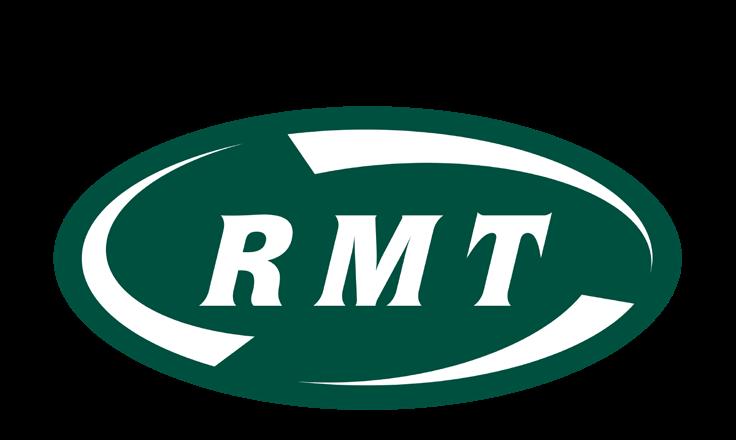

Deep-Sea Update August 2025
A MESSAGE FROM YOUR NATIONAL SECRETARY
Dear Colleagues,
Hopefully over the past few months you will have seen increased RMT visibility within the deep-sea sector. Visibility of RMT officials’ onboard visits are important for seafarer members, and we are prioritising deep-sea vessels when they’re in UK ports.
Visibility is vitally important to me too, as your national secretary, because it allows me to observe your working environment, union noticeboards, mess rooms, accommodation standards and company communication with our members over issues like safety and employer benefits.
We are focusing on organisation in the next quarter. We are building more effective representative structures, with a minimum in the deep-sea of one RMT representative on every vessel. We need RMT reps in all departments so we can persuade all employers to facilitate regular shipboard meetings to discuss the issues that are most important to you and your colleagues, and not just when your ship is in port.

To do this we need the active involvement of more RMT members. This will improve the service you get from your union and raise standards onboard your vessel and in the wider deep-sea sector. That is why we are organising reps’ courses specifically designed for RMT members in the deep-sea. Details will be circulated shortly but the aim is to develop a network of reps across the companies where we organise so that RMT reps and activists can discuss shared concerns and develop as a collective in the deep-sea sector.
We are also advertising for RMT representatives at Foreland Shipping and PNTL. These are for three-year terms and will help retain the skills and experiences of existing reps whilst recruiting a new generation of RMT reps who want to get involved in the workplace and in the union.
RMT can never have too many active members and if you have any questions about what the rep’s role involves, then please get in contact. The one thing seafarers have when away at sea, is time. I strongly encourage deep-sea members to use that time to engage with your union at branch, regional or national official level to raise questions and to get involved in the union’s work to deliver jobs, better pay, conditions and training for Ratings in the deep-sea sector.
Guidance, support and training are available to members on request. This is a good use of your time onboard and will help you and your union progress the industrial issues that matter to you and your colleagues onboard.
Regards, Darren Procter
National secretary Darren Procter (right) with Kevin Watson aboard the PNTL’s Pacific Heron earlier this month
WHAT ARE YOUR PRIORITIES?
To field and respond to members’ concerns we need to ensure that RMT members in the deep-sea understand what the union can do for them and how the union works. RMT is a democratic union designed to ensure that rank and file members directly influence and inform the policies and actions that the union then pursues.
This works best when active and organised members submit their demands which then form the industrial and organising strategies in each company and in each sector of the union. Members can start this by agreeing priority areas at Branch level or on your vessel. Then we can take company specific or sector specific actions to achieve these aims.
Sitting back and complaining about things in a bar or in the mess has never changed anything, so if we are to be effective in making workplace and industrial changes that you and your colleagues want then let’s start that discussion, starting with your immediate priorities in the deep-sea sector.
APPRENTICES
RFA convenor Ian Parkin and I recently attended HMS Sultan in Gosport to address engine room apprentices who have embarked on career at sea with the RFA. We are seeing more apprentice ratings being taken on by deep-sea companies, but this needs to be drastically increased, particularly within the cruise ship sector which is awash with money but continues to make excuse after excuse to avoid training UK ratings.

MINIMUM STANDARDS
Your union has recently introduced sectoral maritime organising meetings that allow us to break down the sectors in which we organise to compare pay and terms and conditions of employment between the sectors where our seafarer members work.
This helps us make progress union policy and informs discussion of priorities for the forthcoming quarter. At the last meeting, the biggest issues for our members were internet connectivity and campaigning for 1:1 leave as a minimum. Sickness provision during engagement periods was also identified as a key issue, as some employers are not providing cover over a rolling 12-month period.
RMT MARITIME POLICY UPDATE
Over the recent months we have implemented the following policies for our seafarer members, including in the deep-sea sector. These include:
• One for one leave
• Definition of Maritime Cabotage
• UK Register and UK seafarer jobs on government contracted ships
• Free Internet Connectivity
• Campaigning for training and jobs in the cruise industry
CRUISE SECTOR
The DfT has issued sea passenger data for 2024. This shows that the cruise sector is booming, increasing the number of passengers to 3.1 million. That is a 16% increase in one year and a staggering 51% on the 2019 figure pre-pandemic.
Southampton remains the main cruise industry port, and we are working with new impetus to get a better deal for UK seafarers from a cruise industry that is booming again after collapsing in the pandemic, paying out massive dividends and crewing these enormous vessels with seafarers on some of the lowest pay and terms and conditions in the global maritime industry.
The motion on the cruise industry submitted to the 2025 AGM in Glasgow by Southampton Shipping was unanimously passed and has been ratified by your National Executive Committee. Now the work begins to set out the history and to get more training and jobs back to the UK.
INTERNET CONNECTIVITY
There has been significant improvement in the reliability and accessibility of onboard internet connectivity, but concerns remain about usage and data allowances across several companies with differing approaches being taken, some implementing a fair use policy whilst others capping usage allowance for individual seafarers.
It is also noticeable that whilst those who have been at sea for decades appreciate the introduction of the internet, they have become accustomed to life without internet access, whilst the younger generation have grown up with this technology and the internet access it depends on. If we are to attract the younger generation to train and work as seafarers, we must ensure that investment is sufficient to provide an internet connection that is sufficiently reliable and resilient so that the vessel is a home from home.
CONGRATULATIONS TO DAREN!
I would like to congratulate Daren Ireland who was previously the lead officer for PNTL and several other Maritime employers in his previous capacity as regional organiser in the Northwest, based in the union’s Liverpool office.
Whilst Daren has a railway background, his meticulous attention to detail and ability to negotiate have secured the respect of members at the companies he covered.
Daren stood in the recent election for RMT Assistant General Secretary (AGS) and was successful. He no longer has responsibility as a lead officer within Maritime and now works out of Unity House with the General Secretary, Eddie Dempsey, Senior Assistant General Secretary, John Leach and me.
Daren will be an asset to the national leadership, utilising his clear attributes, including his understanding of the complexities we face within the maritime sector to make us stronger as a trade union.

HOW MUCH ARE YOU PAID?
In many industries, including shipping, there is quite often a discussion about compliance with the National Minimum Wage (NMW). Over the past few years this has become a prominent discussion in specific sectors, particularly ro-ro ferries because of the scandalous actions of P&O Ferries.
However, when we ask members in the deep-sea sector about their hourly rate of pay, most do not know if it is NMW compliant (currently £12.21 per hour for workers aged 21 or over) or what formula their employer uses to determine members’ hourly rate of pay.
As seafarers know, permanently contracted overtime and specific payments for travel and other entitlements are common. This can make it difficult to calculate a seafarer’s hourly rate of pay, especially when the Maritime Labour Convention only stipulates minimum hours of rest (77-hours per week) rather than hours worked.
Be sure to contact RMT if you are concerned about your hourly rate of pay, especially during busy periods of work when you could be working 12 hours or more per day.
CAN WE HELP AGENCY WORKERS?
During shipboard visits and conversations with our RMT members and reps I often get asked if RMT can help agency workers, and if agency crew should join the union. The answer is simple: most definitely yes! If seafarers are working on vessels where we negotiate with the employer, we will take up any concerns raised by members of the crew to ensure that they are paid in accordance with our terms and conditions and not being employed on contracts that undermine rates of pay and conditions negotiated by RMT. Even when seafarers are not on a vessel covered by RMT terms and conditions, we can assist.
We were contacted last year by a seafarer who had taken an agency job on a vessel in Australia. The conditions he had expected, based on the crewing agency’s description, did not match the reality onboard, with poor accommodation (four to a cabin) and ship mates who could not speak English.
The seafarer informed the agency of the situation and told them he wanted to return home but was told that he would be charged for the flight home and for the cost of flying in his replacement. Within 24 hours of the RMT contacting the agency, diplomatically explaining our position and our intent if the agency did not treat our member with decency and respect, the seafarer was repatriated home, with no cost to him for his flight or that of his replacement. If he had not been an RMT member, this would have been a costly experience for an agency seafarer.
BENEFITS OF BEING AN RMT MEMBER
One of the biggest concerns when visiting various vessels is that members do not necessarily know the benefits of being in the RMT, whilst these are often publicised within RMT News the feed back that I have received when visiting members is that this is an area we could improve in communicating to the workplace. If you search on the internet RMT Member benefits this will take you to the website that identifies all benefits and allow you to download the appropriate form if required.
These benefits include but are not limited to:
• Accident benefit
• Death grant
• Orphan benefit
• Retirement benefit
• Permanent downgrading or demotion benefit
• Free will service
• Legal services for you and your family
• Credit Union
• Education course
PHOTO GALLERY
Please see pictures from shipboard visits across the various employers in the deep-sea sector since the last publication, raising the visibility and accessibility of RMT for the membership.
We worked to provide updates, answer questions and assist with the recruitment of your colleagues who are not yet a member of the RMT. As your National Secretary and a seafarer, I know how important it is for your union to be onboard vessels, and we know that our members appreciate and benefit from this openness and accessibility.
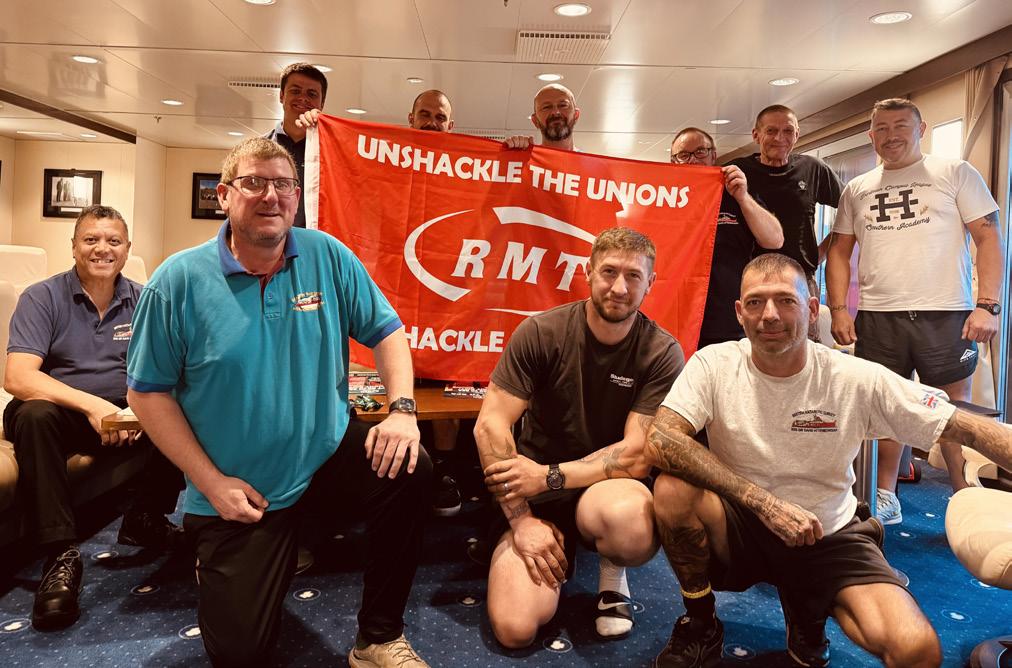



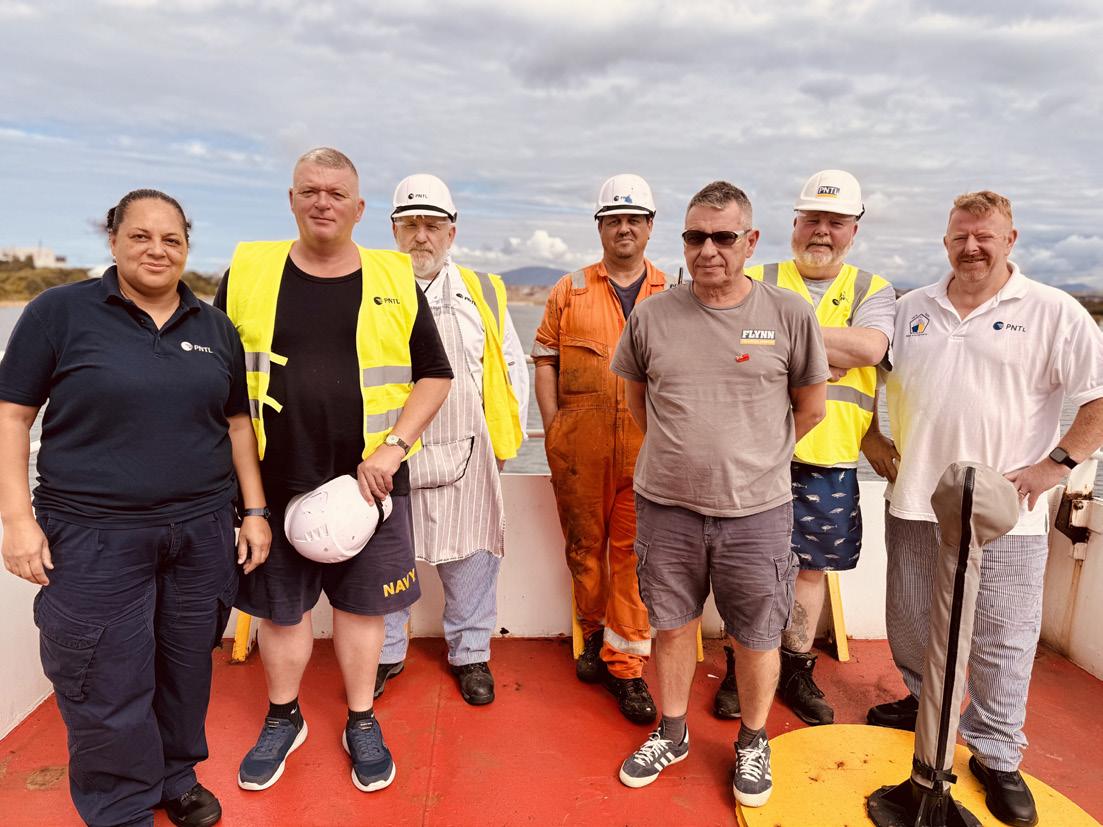

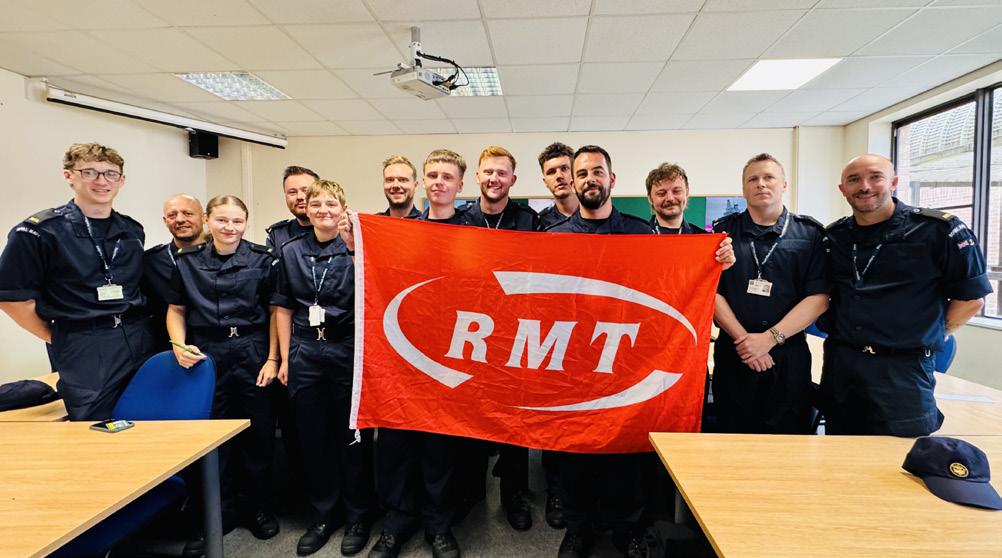
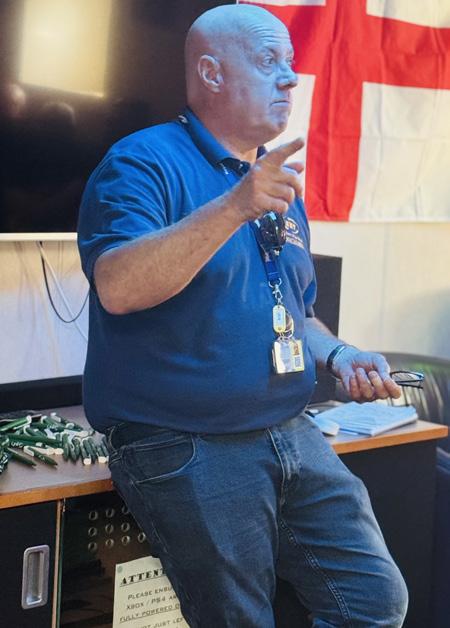


Visiting British Antarctic Survey vessel, Sir David Attenborough in Harwich port in July
HMS Sultan visit with RFA Engine Room Rating Apprentices July’s visit to RFA Tidesurge
Visit to the PNTL vessel Pacific Heron in Barrow-in-Furness
July visit to the NOC vessel, RRS Discovery
EMPLOYER UPDATES
FORELAND SHIPPING
Since the last update, members at Foreland Shipping have accepted a 2 year pay offer and we are no longer in dispute with the employer. It was clear that our members did not want to accept the 5-year deal negotiated with officers’ union Nautilus.
Due to the resolve of our members, we were able to negotiate a 2-year deal which was accepted with an increase in pay of 4.2% + 0.25% in year 1 and average weekly earnings calculator for year 2. In addition to pay, improvements to members’ terms and conditions of employment were also agreed, and we are currently reviewing the Collective Bargaining Agreement which sets out the terms of employment for RMT members at Foreland Shipping, following the 7-year extension of the MoD contract last December.
NATIONAL OCEANOGRAPHY CENTRE
We are currently in dispute with NOC over rates of pay and have a meeting planned where we hope the employer will provide an improved offer. It is vital that all members are encouraging those Ratings at NOC who are not currently members to join the RMT. We also need to identify RMT representatives on those shifts where we do not currently have a shipboard rep. There has also been an emotive matter which emerged recently regarding the employer’s use of CCTV which is being discussed with members.
BRITISH ANTARCTIC SURVEY
I am pleased to report a significant turnaround at BAS in terms of union membership and activity levels onboard. BAS pay talks start shortly and we have some barriers to overcome in terms of pay structure and progression but hopefully these will be satisfactorily addressed during pay talks, as the employer recognises that these pay issues are affecting BAS’s recruitment and retention of the seafarers they need to operate their research vessels.
We have used virtual meetings with members onboard BAS vessels whilst on deep-sea deployment to provide updates and engage on matters of concern, whilst ensuring that we visit the vessel to follow up on these when BAS vessels arrive in Harwich Port.
ROYAL FLEET AUXILIARY
We are hopeful that the RFA, MoD and other government departments will approach the negotiating table for the 2025-26 pay talks in a spirit of co-operation and constructiveness, as we need to address the pay and terms and conditions of employment to make the RFA competitive again as an employer.
Over the austerity years RMT built the case for RFA members to receive pay and contractual improvements. Last year’s high profile industrial dispute was partly settled on the proviso that RFA members’ long-standing losses from the Civil Service Pay Remit and other contractual short comings would be addressed. We are working closer than ever before with RFA and government to achieve these improvements and to provide greater accessibility for RFA members to their basic terms and conditions.
CARNIVAL CRUISES
As reported in the last update, we have accepted a pay offer, and we are in dialogue in relation to Rating Apprentices with Carnival and within the cruise ship sector generally because the employment and training policies in the cruise sector have been a major factor in the decline of UK Ratings over the past 30 years. We have been talking about an apprenticeship programme with this employer for several years now, including at the Merchant Navy Training Board but have yet to see the employer deliver on initial assurances. We are currently discussing how the union takes the apprenticeship campaign forward with Carnival.
VIRTUAL MEETINGS
Over the past six months or so we have introduced virtual meetings within the deep-sea sector, allowing us to provide updates and receive feedback from members. We have received positive feedback from members at BAS and RFA and will continue to develop these as a form of communication specifically for your sector. This enables us to communicate with individuals who are onboard or at home and we generally use Microsoft teams or zoom. We are currently planning dates for three meetings between now and the end of the year for RFA, and a stand-alone meeting for RFA Apprentices.
DID YOU KNOW?
To ensure that rank and file members of the union understand how we as a union function, what sets us apart from other trade unions as the most democratic trade in the UK it is important you know who does what within RMT. In this edition we focus on the role of the NEC.
THE ROLE OF THE NATIONAL EXECUTIVE COMMITTEE
The union is run by the national executive committee (or ‘the executive’), which consists of the president, the general secretary, two assistant general secretaries, the national secretary and sixteen representatives: twelve from the general grades, four from the maritime grades.
A detailed list of the powers and responsibilities of the national executive committee can be found in Rule 4 of the union’s rule book: broadly speaking, it is responsible for the general administration of the union. The general and maritime grades representatives stand for election in a geographical area and get elected for a three-year term of office. During this time, the NEC members are released from work and paid a salary by the union.
A record of the decisions made in NEC meetings is sent to branches every month. They are also posted in the members area of this website. Branches can appeal to the annual general meeting against decisions made by the National Executive Committee.
NEC meetings are the way in which the business of the union is dealt with, whether it be discussing the progress of a particular set of pay negotiations; formulating recruitment strategy; deciding what motions to put on the agenda of the TUC congress; or setting the membership subscription rates.
Members of the National Executive Committee are elected by all the members in the geographical area they represent and, as such, they are accountable to that membership. They attend and make regular reports to their regional councils, as well as being involved in their region’s recruitment activities. It is at these meetings that they can be asked for further details about issues that have been dealt with and, if necessary, called to account for their decisions.
At present we have a vacancy within Maritime and the remaining three seats are filled by:
Gareth Jameson. (Maritime region 1)

Gareth is currently employed by RFA and been at sea for 27 years, working in the deck dept and is a member of Southampton Shipping and has been elected until December 31st, 2027.
His geographical electoral region is M1 which is the southern region.
David Gwatkin. (Maritime Region 2)

Dave is currently employed by Stena Line and has worked at sea for 30 years, working for both Stena line and RFA as a steward, most recently onboard the Stena Adventurer out of the port of Holyhead. Dave is a member of Holyhead shipping and has been elected to the NEC until 31st December 2026. His geographical electoral region is the North of England, republic of Ireland and Isle of Mann.
Davey Douglas (Maritime Region 3)

Davey has been at sea for 35+ years working for several employers during that period as a cook. He is currently employed as a head chef for NorthLink Ferries operating on the Aberdeen – Orkney route and he is also the current branch secretary of Aberdeen shipping branch. Davey is elected until 31st December 2025 and an election his successor will commence shortly. His geographical electoral region is Scotland and Northern Ireland.
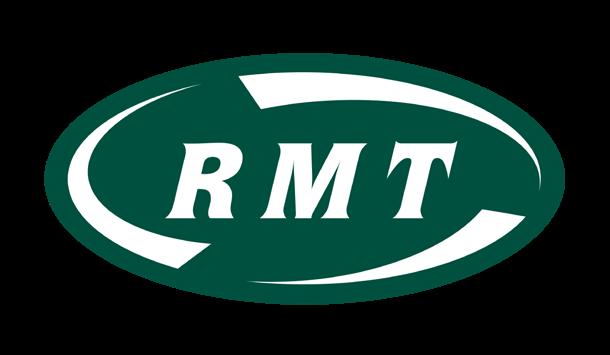
www.rmt.org.uk/join

